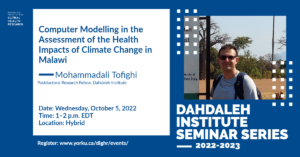Post
Published on May 25, 2023


On October 5, Dahdaleh postdoctoral research fellow Mohammadali Tofighi introduced computer modelling approaches and applications for modelling health impacts caused by climate change in Malawi.
The modelling process can be abstract. Mohammadali discussed a few modelling approaches that can be used based on the level of abstraction and the information available. For example, dynamic systems modelling works best for low abstraction data because it is numerical with analysis of physical state variables and algebraic differential equations. Whereas system dynamics modelling can work well with high-abstraction ideas and uses feedback loops to gather data. Next, agent-based modelling can account for and measure individual behaviour, direct and indirect interaction, and a wide range of abstractions.
The research team were able to map out their data to find patterns, and correlations, and apply real-world solutions that address the spread of disease or food insecurity caused by climate change. They used a combination of these modelling techniques, but he especially highlighted agent-based modelling, which allows for flexible, expandable, and sharable data collection. It can depict how environments and agents interact. For instance, the level of rainfall can inform the rate of malaria being spread. Ultimately, these models can simulate rapidly changing weather patterns and prepare local communities for these challenges.
Watch the seminar presentation below:
Connect with Mohammadali Tofighi
Themes | Global Health & Humanitarianism, Global Health Foresighting, Planetary Health |
Status | Active |
Related Work | |
Updates |
N/A
|
People |
You may also be interested in...
Recap – The Importance of Planetary Health and Indigenous Wellbeing Showcased Through Film
On October 24, 2023, Dahdaleh research fellow Mark Terry presented the films created at the fourth annual Planetary Health Film Lab by Indigenous youth in Belize. Dr. Terry and the participants created six films within ...Read more about this Post
Recap — Colonial Encounters, Human Rights and Mental Health Laws in Canada, Kenya and Australia, with Marina Morrow
On January 15, 2025, Dahdaleh faculty fellow Marina Morrow delved into the intersections of colonial encounters, human rights and mental health laws in Canada, Kenya and Australia. The seminar highlighted how mental health policies and practices ...Read more about this Post
Finalist Award for Best Documentary Announced at 2023 Student World Impact Film Festival
The Planetary Health Film Lab (PHFL) was nominated, and won, a Finalist Award (2nd place) for a documentary titled, "Planetary Health Film Lab – Ecuador Edition" at the Student World Impact Film Festival (SWIFF). SWIFF ...Read more about this Post
